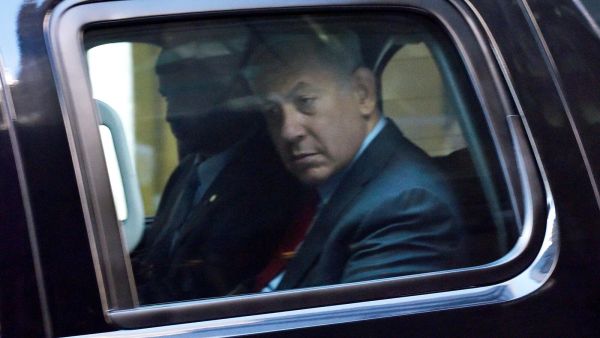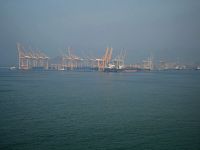The PA President Mahmood Abbas and the Palestinians can now relax for the so-called Deal of the Century is as good as gone. It has been rendered ineffective and defective by the crisis in Israeli politics and the dissolution of the Knesset which goes into recess till a General Election slated for September 17.
{"preview_thumbnail":"https://cdn.flowplayer.com/6684a05f-6468-4ecd-87d5-a748773282a3/i/v-i-8…","video_id":"8de7177a-79e6-473b-ad8d-909ad7fed97e","player_id":"8ca46225-42a2-4245-9c20-7850ae937431","provider":"flowplayer","video":"Trump Tells The UK to 'Walk Away' From Europe"}
Shock and Awe
Never has policy been more clearly bamboozled than it has been today with waiting-to-be Prime Minister Benjamin Netanyahu in shock about what has just happened to him, waiting for another election fight which he and his rightwing Likud Party could very well lose.
It was almost as if he had been robbed of his win in the last April 9 elections that just about gave him another free run to dominate Israeli politics save for one of his smaller coalition parties - of Yisrael Beiteinu under Avigador Lieberman – that would not give him a "yes" vote without concessions, which Netanyahu felt he couldn't grant without alienating his religious partners.
Of course, this abrupt turning point – for it would have been Netanyahu’s 5th government with 4 in consecutive row since May 2009 - breaks his mesmerizing and almost messianic hold on Israeli politics.
Of course, this abrupt turning point – for it would have been Netanyahu’s 5th government with 4 in consecutive row since May 2009 - breaks his mesmerizing and almost messianic hold on Israeli politics. While he will still go down as Israel's second longest prime minister after David Ben-Gurion there is now a slur on his political experiment coming from non-other than his arch nemesis and former confidente, Lieberman who served in the different Netanyahu cabinets including holding the foreign and defense portfolios and who triggered the last election as he quit the government, seeing the prime minister as too light on Hamas and security. This time around he is likely to be seen as Netanyahu’s main challenger for the top PM job.
Aside, and with the lurking constitutional problems with the upcoming Netanyahu legal hearings on corruption charges that will start in October, this domestic crisis has thrown asunder the awaited deal of the century, perhaps not so much for the beleaguered Israeli prime minister but more so for the Trump administration and its keenness to put into action its ‘Deal of the Century’ plan which it has been working on for the last two years and was just about to go into action.
Deal of The Century
Now the deal is likely to be torpedoed, at least for the next five months if not longer – and even stalemated – until Israel puts its house in order and possibly under a new prime minister. The Trump administration under one of its main lieutenants Jared Kushner, is ready to roll the dice of unveiling the “economic part” of Deal of the Century in a workshop in Manama at the end of June with participation from Gulf states like Saudi Arabia, United Arab Emirates, Bahrain and surprisingly Qatar.
The Trump administration under one of its main lieutenants Jared Kushner, is ready to roll the dice of unveiling the “economic part” of Deal of the Century in a workshop in Manama at the end of June with participation from Gulf states like Saudi Arabia, United Arab Emirates, Bahrain and surprisingly Qatar.
From a rational and logical point of view, the economic workshop of finance officials in which the Israeli Finance Minister is participating should be held back because of the simple reason that Israel has now no effective government with the Knesset recess and the fact that Netanyahu hasn’t a leg to stand on anymore.
Kushner is insisting the venue will be held on time and will come out with economic and business plans as well as investment opportunities in the Palestinian territories and most of which will be paid by the Gulf countries.
Putting The Cart Before The Horse
But economic before politics is not the way to deal with the intractable Palestinian-Israel conflict that has bordered on the fratricidal over the past seven decades.
Aside from the fact that what is being offered between $50-$70 billion – large sums of money – that probably wouldn’t come in the end because we know from past experiences what donor’s conferences are like, the Bahrain meeting is like putting the cart before the horse.
Aside from the fact that what is being offered between $50-$70 billion – large sums of money – that probably wouldn’t come in the end because we know from past experiences what donor’s conferences are like, the Bahrain meeting is like putting the cart before the horse.
For Palestinians there are fundamental principles at stake and which appear to have been brushed under the carpet. There is the whole issue of occupation, land, Jerusalem, repatriation of refugees and there are secondary issues like water which is vital for sustainability. All these have not being addressed or it would seem that way because the Deal has not been unveiled.
But these are fundamental issues neither Netanyahu or whoever forms the next Israeli government or Trump administration can wriggle out of. The Americans have already trodden on long established policies with regard to Jerusalem and the Golan Heights recognizing both as Israeli territory and moving the US Embassy to the Holy City to prove their point of view. However, this doesn’t mean they are right especially since there are international resolutions that condemn the Israeli occupation and demand that it leaves.
So where do we go from here? What is being introduced are “piecemeal” solutions coupled with much fluidity not only among the Palestinians, Arab countries who are divided on the deal and in Israel with its domestic quibbles. These are just some of the stumbling blocks which the Trump administration may not fully realize the extent of. And in the end, Trump may give up because he would shortly be facing the roll-out campaign of the 2020 US presidential elections that demand all his energies. That would mean putting the Palestinian-Israeli conflict off till next decade with a snagging feeling this is what the Israelis want.
“New Palestine?”
However, it’s still early days to speculate just what will happen. It would be interesting to have the Deal unveiled and to see what it contains regardless of the current rumors – that seem to be very real – that the plan is taking away more Palestinian land which houses the many Jewish settlements spread across the West Bank and the Dead Sea and putting them under Israeli sovereignty. This would mean taking whole chunks of territory from what would become “Palestine” and effectively splitting into cantons. And that begs the question: Where would Palestine be in this circumstance.
Much talk has centered also on the fact that “Palestine” would “expand” westwards to the Gaza Strip that would itself expand to bits and pieces of Sinai of course, with the permission of Egypt. But this fails to take into account the controller of Gaza is Hamas, who have exercised a tight-fisted grip on the strip and are not about to hand control to anyone unless there is a lot of funding involved.
So the Deal of the Century is in a very murky situation and might in the medium term become another shelved blueprint like the Camp David of the late 1970s.
So the Deal of the Century is in a very murky situation and might in the medium term become another shelved blueprint like the Camp David of the late 1970s. One thing that might be said is that the Trump administration has audacity. While this should not be seen as one of his property deals, the fact that he is trying to kick-start the Middle East situation is something to be recognized since a lot of previous administrations starting from Clinton, Bush and Obama have been unwilling to push the peace process forward while saying the parties – Israelis and Palestinians – must do it themselves and at their own pace. This puts the Palestinians at a distinct disadvantage because the strings were always in the hands of the Israelis.







